2025 Gulf Data Center Power Rankings: The Top Facilities Not Owned by Big Tech
Explore the evolving landscape of Gulf data centers in 2025, emphasizing sustainability, security, and regional digital sovereignty.
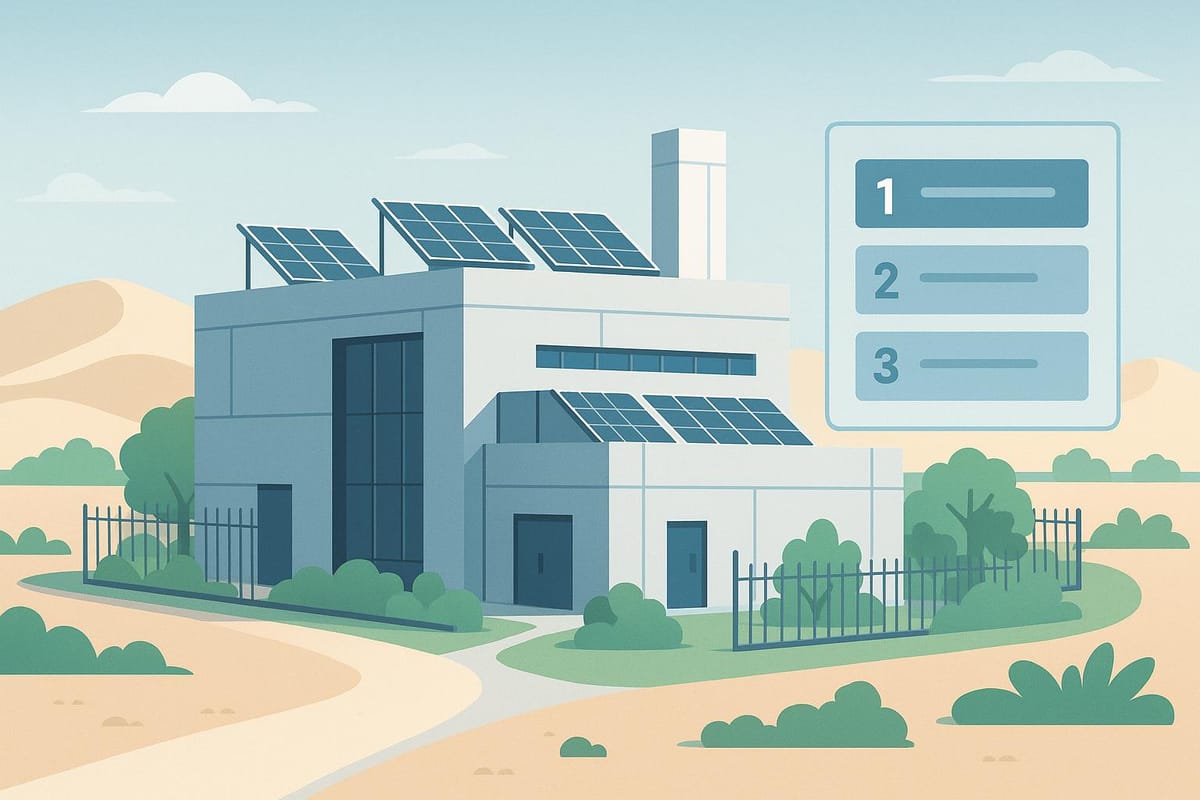
The Gulf's data center landscape is transforming in 2025. Regional providers are stepping up to meet growing demand, focusing on data sovereignty, sustainability, and advanced technologies. Here's what you need to know:
- Top Facilities: The rankings spotlight independent centers like Moro Hub (UAE), Batelco (Bahrain), and STC Cloud Center (Saudi Arabia). These facilities excel in performance, security, and regional integration.
- Evaluation Criteria: Centers were ranked based on technical infrastructure (30%), operational reliability (25%), security compliance (20%), sustainability (15%), and regional integration (10%).
- Market Trends: There's a shift towards sovereign cloud solutions, edge computing, and AI-ready infrastructure, driven by national digital strategies and stricter regulations.
- Sustainability Focus: Many centers are adopting renewable energy, energy-efficient cooling, and smart management systems to reduce environmental impact.
Quick Comparison
| Facility | Location | Power Capacity | Certifications | Unique Features |
|---|---|---|---|---|
| Batelco Data Center | Bahrain | 30 MW | ISO 27001, PCI DSS | Solar integration, financial sector focus |
| Moro Hub Solar Data Center | UAE (Dubai) | Solar-powered | ISO 27001, ISO 14001 | Renewable energy, high-density racks |
| STC Cloud Center | Saudi Arabia | 650 MW (expanding) | ISO 27001, SOC 2 | Localized solutions, bilingual support |
| Ooredoo Data Center | Qatar (Doha) | 15 MW | Tier III certified | AI-focused, smart city tech support |
| Gulf Data Hub | UAE (Dubai) | 35–40 MW | ISO 27001, PCI DSS | Flexible options, mid-range pricing |
| DataVolt NEOM Center | Saudi Arabia | 30 MW (Phase 1) | Tier III+, LEED Gold | 100% renewable, AI-driven infrastructure |
| Beyon Tier III Center | Bahrain | Tier III | Multi-layered security | Carrier-neutral, financial sector focus |
| Etisalat Data Center | UAE (Abu Dhabi) | 40% UAE capacity | Tier III+ standards | Key subsea cable connectivity |
| Meeza M-VAULT | Qatar | 15 MW | Tier III certified | Hybrid cloud, low-latency connectivity |
These rankings highlight how Gulf-based providers are creating robust, sustainable, and secure digital infrastructures to meet the region's evolving needs. Dive into the full article for detailed insights on each facility.
Data Center Ranking Methods
Our ranking system evaluates independent data centers based on their alignment with regional sovereignty and performance goals. The framework focuses on five key areas: technical infrastructure, operational performance, security compliance, sustainability, and regional integration. Each category is weighted to reflect its importance, ensuring a comprehensive assessment.
Technical Infrastructure (30%)
This category examines the backbone of a data center's operations. Key considerations include:
- Tier certifications that validate reliability.
- Efficient power usage for optimal energy management.
- Redundant systems to prevent service disruptions.
- Multiple network connections for enhanced connectivity.
Operational Performance (25%)
We prioritise uptime and operational reliability. Facilities must demonstrate consistent high availability to meet the growing demand for digital services in the region.
Security and Compliance (20%)
Security is non-negotiable. Data centers are evaluated on their adherence to standards like ISO 27001, PCI DSS, and SOC 2 Type II, as well as their ability to meet local data sovereignty requirements. These measures are critical for protecting enterprise data in an increasingly challenging cyber landscape.
Sustainability Metrics (15%)
Environmental responsibility plays a significant role. Facilities are assessed on their use of renewable energy, water conservation efforts, waste heat recovery systems, and initiatives to reduce their carbon footprint. This category highlights centres that prioritise green practices over traditional energy sources.
Regional Integration (10%)
This metric looks at how well a data center fits into the local digital ecosystem. Factors include connectivity to local cloud platforms, support for edge computing, content delivery networks, and comprehensive business continuity strategies.
1. Batelco Data Center - Manama
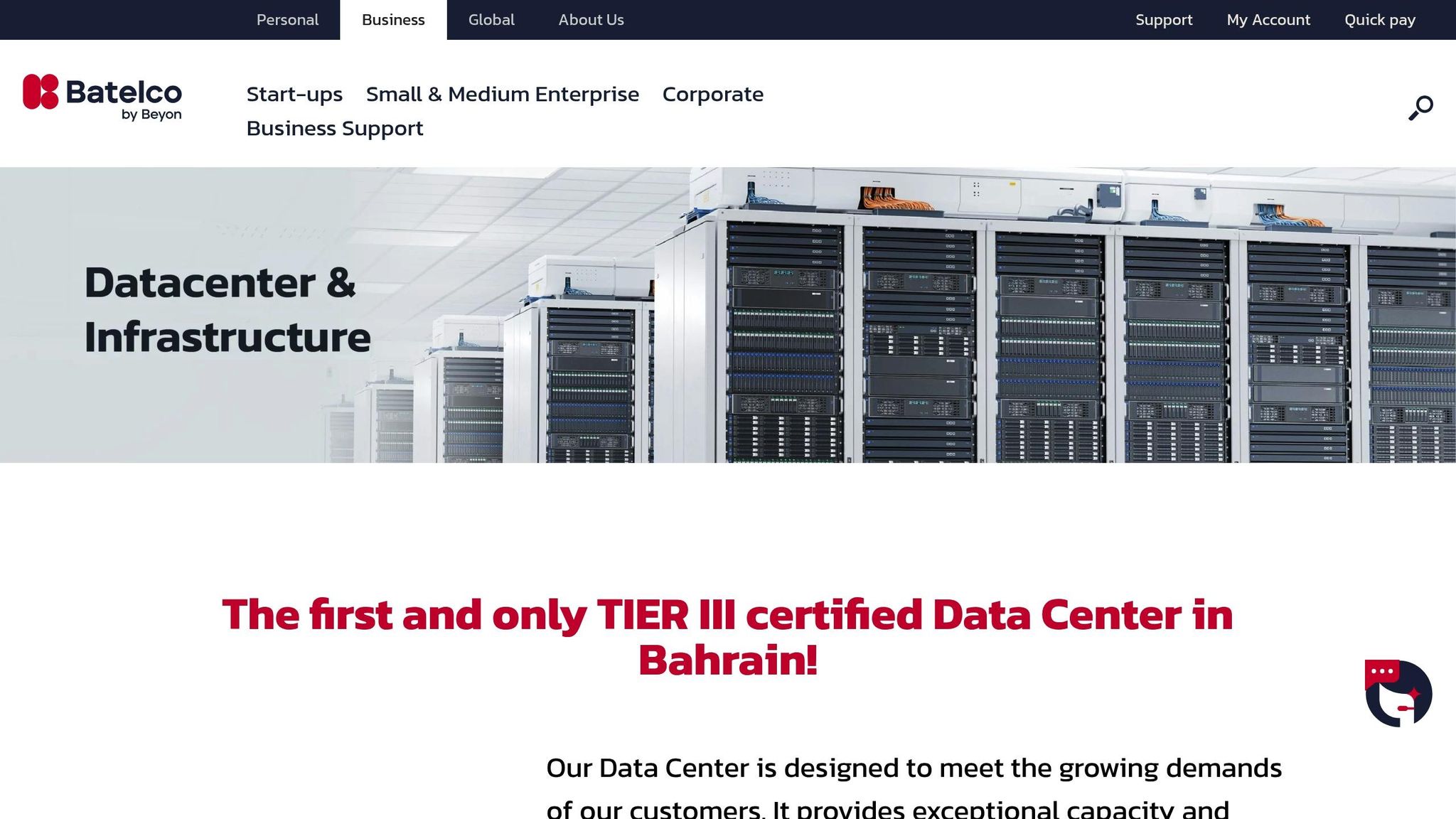
Batelco’s flagship data center in Manama stands out as a hub of technical excellence and strategic value. Spanning 12,000 square metres with a power capacity of 30 MW, this Tier III certified facility guarantees an impressive uptime of 99.982%.
The center boasts top-tier certifications, including ISO 27001, ISO 22301, and PCI DSS. It also features a Power Usage Effectiveness (PUE) rating of 1.4, reflecting its energy efficiency even in the region’s challenging climate.
Strategic Advantages
Manama’s location offers Gulf-based businesses a range of connectivity benefits:
| Metric | Performance |
|---|---|
| UAE Latency | 15ms |
| KSA Latency | 25ms |
| Carrier Partners | 25+ |
| Submarine Systems | FALCON, FOG, GBI |
As a carrier-neutral facility, Batelco’s data center has attracted top telecom providers like Tata Communications, Orange, and PCCW Global. This has created a robust connectivity ecosystem. Additionally, cross-connect pricing is about 30% lower than Dubai’s market rates, offering cost savings for businesses with extensive interconnection needs.
Environmental Innovation
Batelco integrates sustainability into its operations with initiatives such as:
- A 3 MW solar array currently supplying 10% of the center’s power needs, with plans to expand to 5 MW by Q4 2025.
- Smart energy management systems for real-time optimisation.
- Free cooling technology, utilised during Bahrain’s cooler winter months.
Enterprise Appeal
The data center is a trusted partner for Bahrain’s financial sector, with over 60% of the country’s banks relying on its infrastructure. Key clients include Al Baraka Banking Group, Bahrain Islamic Bank, and regional operations of global giants like Huawei, IBM, and SAP. This strong client portfolio underscores the facility’s ability to meet complex enterprise demands.
Future Growth
Batelco is investing AED 550 million to expand the facility, adding 8 MW of IT load capacity by Q3 2025. The expansion includes two new data halls designed for high-performance computing, supporting power densities of up to 20 kW per rack to handle demanding AI workloads. This growth aligns with Bahrain’s digital economy ambitions, which aim to contribute 20% to the GDP by 2026.
With its strategic location, advanced infrastructure, and competitive pricing, Batelco’s Manama data center continues to be a cost-efficient and reliable choice for Gulf-based enterprises.
2. Moro Hub Solar Data Center - Dubai
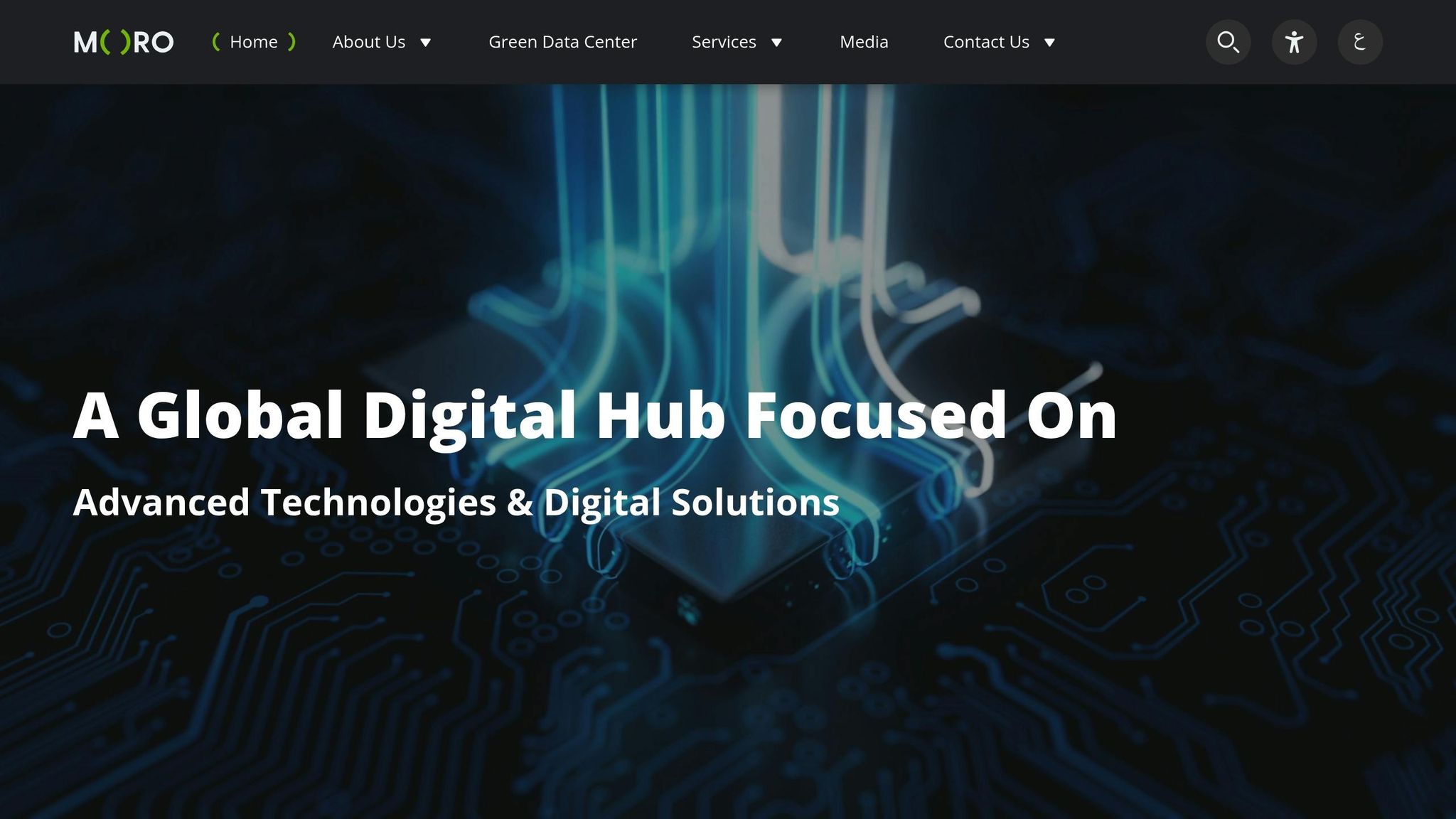
Moro Hub's solar-powered data center is a standout in the region, setting new standards in renewable energy integration. As the UAE's solar-powered data hub, it represents a significant step towards sustainable technology infrastructure.
Infrastructure Specifications
This facility boasts impressive technical features:
| Feature | Specification |
|---|---|
| Power Source | Solar Energy (Primary) |
| Uptime SLA | 99.99% |
| Security | ISO 27001 Certified |
| Environmental | ISO 14001 Certified |
| Cooling | Energy-Efficient Systems |
| Client Density | High-Density Rack Support |
These specifications reflect a commitment to eco-friendly operations through:
- Solar power as the primary energy source
- Advanced, energy-efficient cooling systems
- Sustainable building practices
Strategic Market Position
Moro Hub's carrier-neutral approach makes it an attractive choice for both regional and international organisations. It caters to a variety of sectors, including government entities, financial institutions, and healthcare providers, offering secure and sovereign data hosting solutions.
Growth Trajectory
Dubai's data center landscape is growing rapidly, with a current capacity exceeding 250 MW. By the end of 2025, an additional 150 MW is expected to come online, positioning Moro Hub for substantial growth in the coming years.
Enterprise Appeal
Moro Hub offers several advantages for enterprise clients:
- Sovereign Data Control: Ensures compliance with UAE data residency laws.
- Environmental Compliance: Aligns with corporate ESG goals.
- Reliable Performance: Delivers consistent, enterprise-level service.
- Prime Location: Provides excellent connectivity across the Gulf region.
These features make it a compelling choice for businesses looking to meet modern tech demands while maintaining high standards of performance and compliance.
Future Developments
Looking ahead, Moro Hub plans to expand with modular growth focused on AI and IoT capabilities. Backed by AED 5.51 billion in planned investments, these developments are set to address the needs of emerging technologies.
3. STC Cloud Center - Riyadh
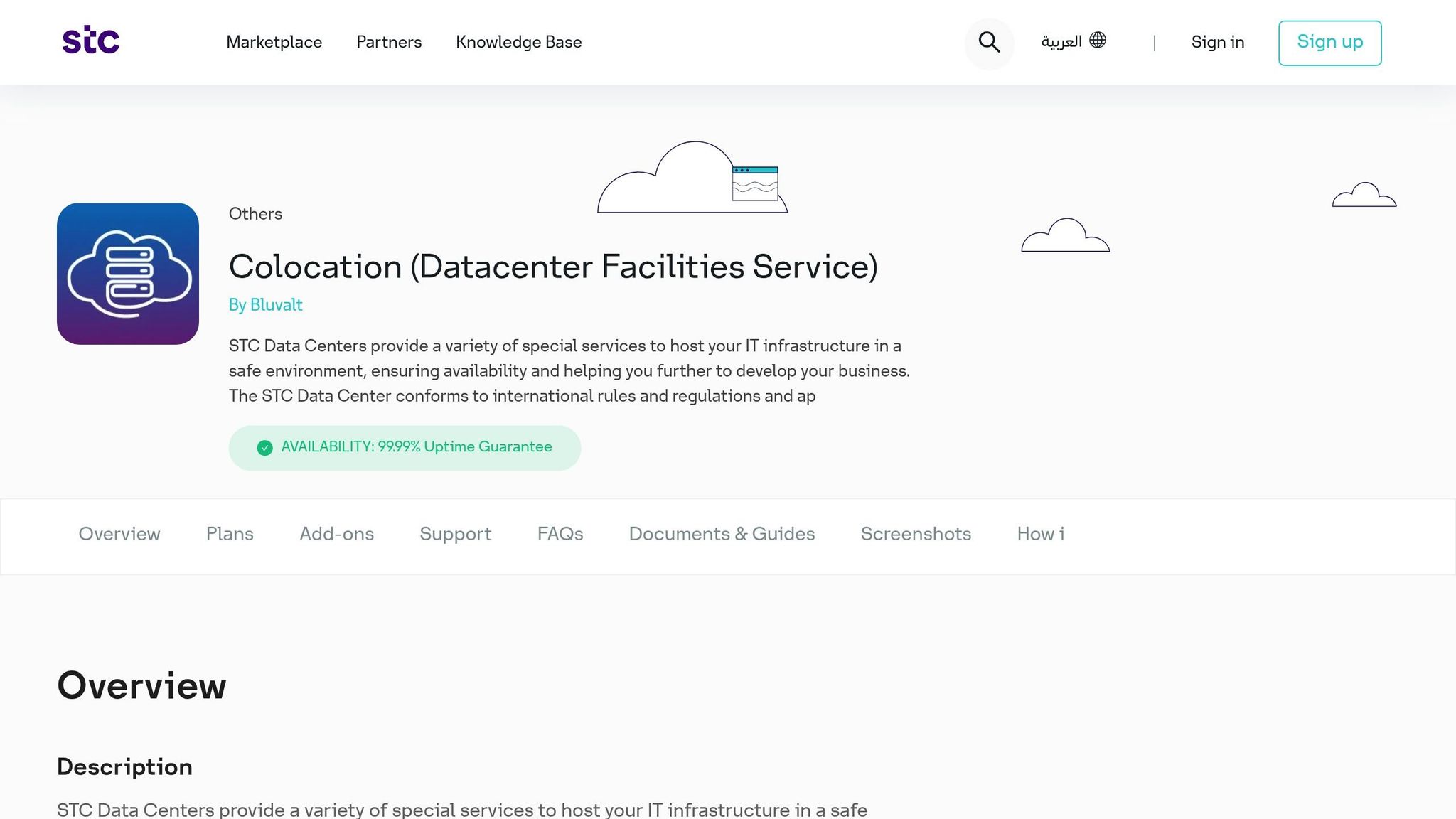
The STC Cloud Center stands as a cornerstone of Saudi Arabia's digital transformation, reflecting the Gulf's commitment to maintaining local data sovereignty. Situated in Riyadh, this facility plays a vital role in supporting the nation's initiatives for digital independence and localised data residency.
Infrastructure Capabilities
| Feature | Specification |
|---|---|
| Colocation Options | Quarter to Full Rack (42U/45U/47U) |
| Power Redundancy | N+1 Configuration |
| Security Certifications | ISO 27001, PCI DSS, SOC 2 |
| Connectivity | Multi-carrier Support |
| Support | 24/7 Arabic/English Technical Assistance |
| Pricing Model | Per kW Wholesale Options |
These features ensure that the STC Cloud Center remains a reliable and high-performing facility, meeting the demands of its clients with precision.
Market Position and Growth
As a critical player in Saudi Arabia's digital economy, the STC Cloud Center is part of a larger strategy to expand the country's data infrastructure. Current investments have already established a capacity exceeding 650 MW, with plans to add nearly 500 MW by the close of 2025. Across the Gulf Cooperation Council (GCC), the data center market is anticipated to grow to AED 34.83 billion (USD 9.49 billion) by 2030.
Enterprise Solutions
The center offers tailored solutions to meet the needs of various industries:
- Government Sector: Supports e-government initiatives while ensuring local data residency compliance.
- Financial Services: Provides secure environments for core banking applications.
- Healthcare Systems: Facilitates compliant management of sensitive patient data.
- Gaming and Content: Enables low-latency solutions for digital entertainment platforms.
Competitive Edge
What sets the STC Cloud Center apart is its deep understanding of the local market and its ability to address Saudi Arabia's unique regulatory and data sovereignty requirements. With bilingual technical support available round the clock and pricing models tailored to the region, the center is particularly attractive to government and financial organisations. Advanced systems ensure uninterrupted operations, further strengthening its reputation.
Technical Excellence
The facility is engineered for top-tier performance, featuring:
- Cooling systems optimised for the region's climate
- Redundant power setups to guarantee reliability
- High-speed connectivity for seamless operations
- Support for edge computing to enhance processing efficiency
Future Trajectory
In line with Saudi Vision 2030, the STC Cloud Center is set to adopt cutting-edge technologies and expand its connectivity options. These efforts will not only solidify its position in the market but also contribute to the Gulf's ambition of establishing a sovereign and advanced data infrastructure.
4. Ooredoo Data Center - Doha
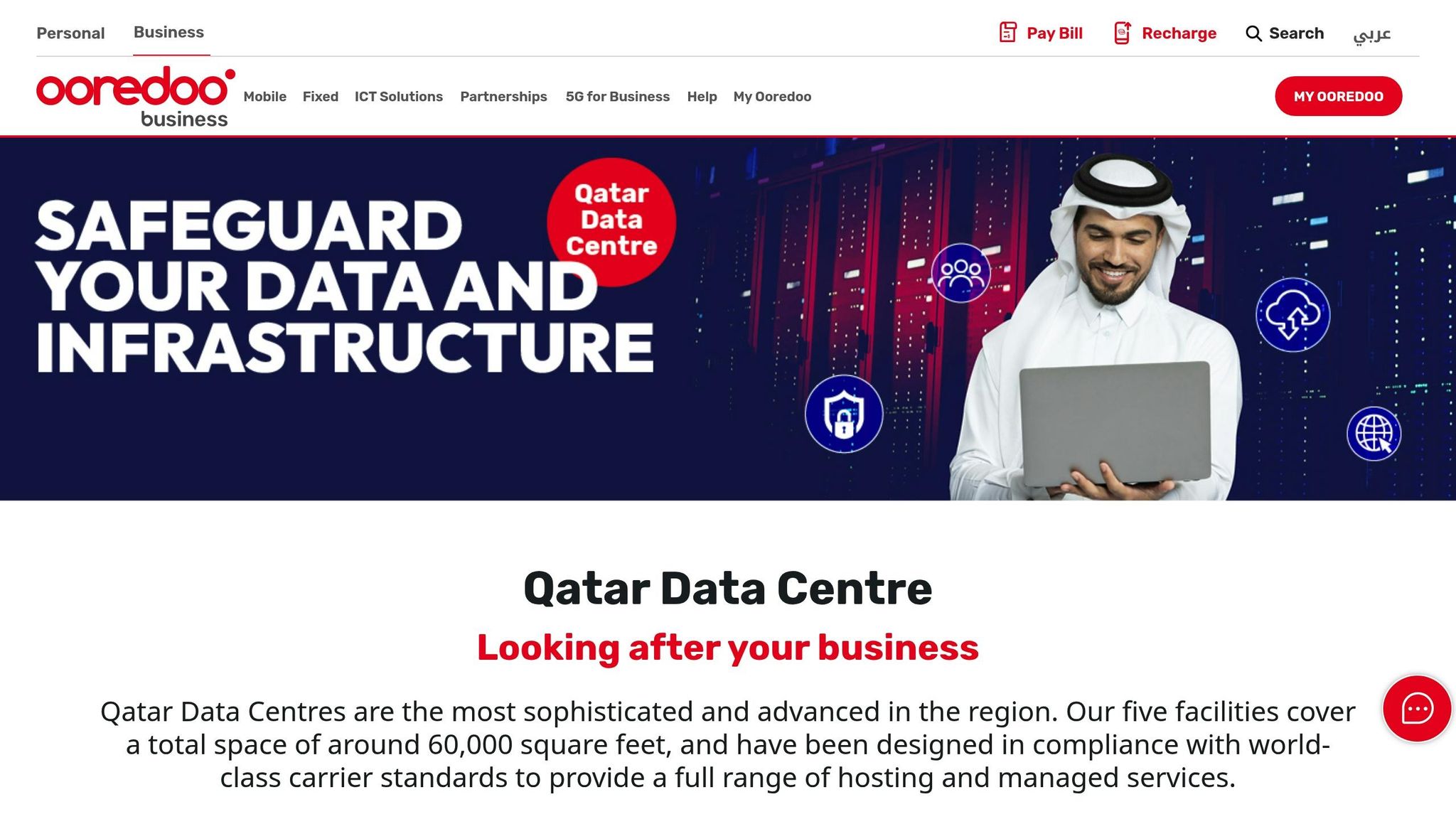
Ooredoo's state-of-the-art data center in Doha is at the forefront of supporting AI and high-performance computing needs, aligning with Qatar's vision for digital independence. This facility played a pivotal role in meeting the digital infrastructure demands during the 2022 FIFA World Cup and is specifically designed to handle advanced workloads.
Infrastructure Specifications
| Feature | Details |
|---|---|
| Total Space | 10,000 m² white space |
| Power Capacity | 15MW IT load |
| Rack Density | Up to 30kW per rack |
| PUE Rating | 1.4 |
| Uptime | 99.982% (Tier III certified) |
| Redundancy | N+1 configuration |
Purpose-Built for AI
The facility is tailored to handle AI-specific tasks, boasting high-density racks that deliver more than double the average power capacity in the region. This setup is critical for enabling smart city technologies and driving Qatar's digital growth. A robust network infrastructure further enhances its performance, ensuring seamless connectivity.
Connectivity Features
A carrier-neutral approach ensures direct access to key submarine cable systems, including:
- 2Africa
- Asia Africa Europe-1 (AAE-1)
This connectivity positions the data center as a hub for global and regional digital traffic.
Comprehensive Security Measures
Security is a top priority, with a seven-layer system in place. This includes:
- AI-powered CCTV monitoring
- Biometric access controls
- 24/7 on-site security personnel
- Advanced perimeter protection
These measures deliver a secure environment for critical operations.
Focus on Sustainability
The facility integrates environmentally conscious technologies, including:
- Free cooling systems
- Smart building management tools
- Real-time energy optimisation
- Collaboration with Qatar's renewable energy projects
These initiatives support Qatar's goals for a greener future.
Strategic Importance
As a cornerstone of Qatar's digital infrastructure, the data center serves essential sectors such as government, finance, healthcare, education, and energy. Its reliability and advanced capabilities make it a key player in the nation's digital transformation.
Future Developments
Ooredoo is committing USD 150 million to expand and enhance its capabilities. Key projects include:
- Adding 3MW of capacity by Q3 2025
- Building a new Tier IV facility in Lusail City
- Establishing edge data centers at strategic locations
Additionally, the facility is equipped for disaster recovery, with seismic reinforcements for earthquakes up to a 7.0 magnitude and the ability to operate independently for up to 72 hours using on-site power generation systems.
These advancements position Ooredoo's Doha facility as a leader in the Gulf's evolving data center landscape.
5. Gulf Data Hub - Dubai
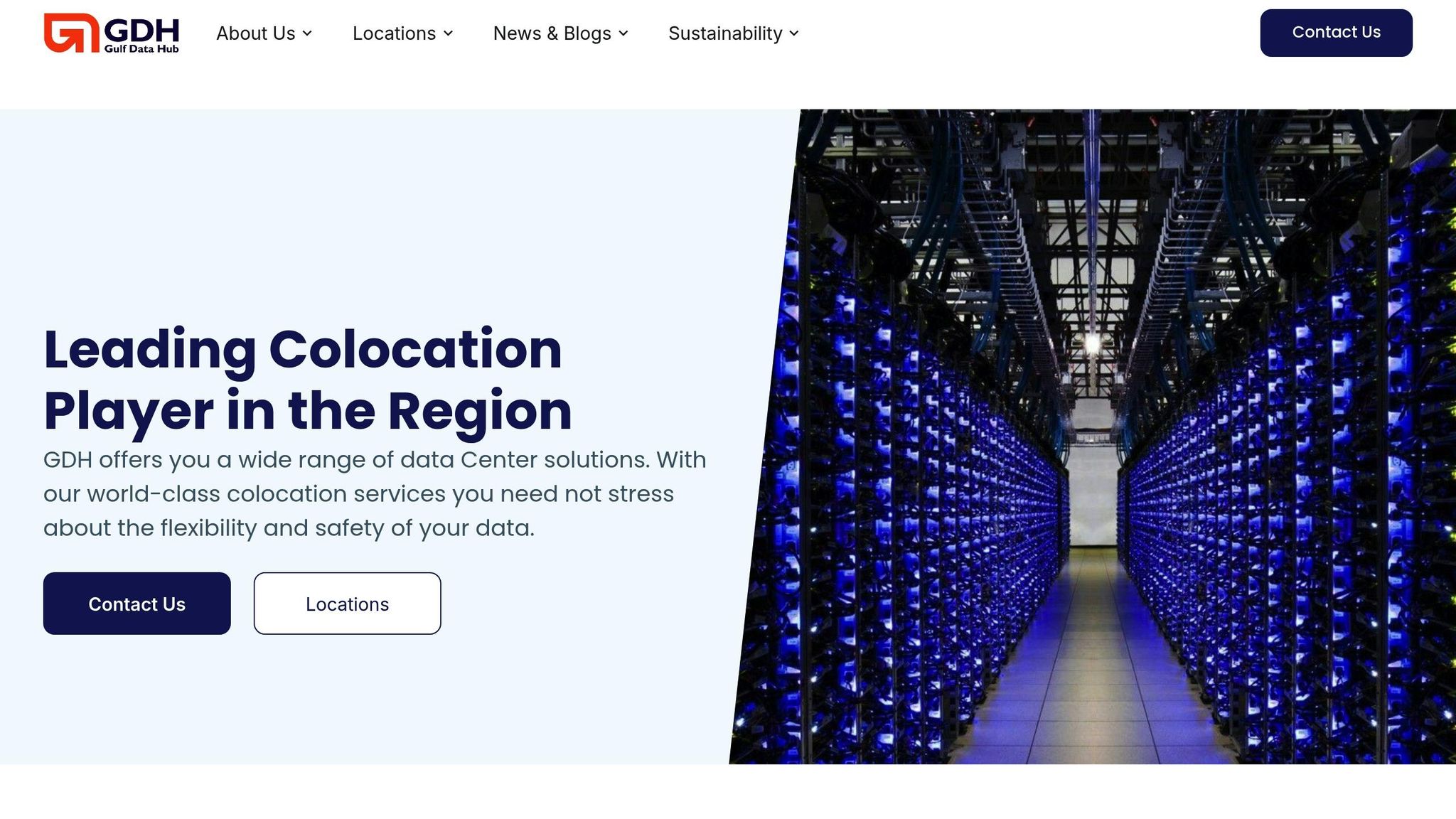
Gulf Data Hub, located in Dubai, stands out as a carrier-neutral data center with an IT capacity of 35–40 MW. It caters to businesses seeking alternatives to hyperscalers while maintaining high infrastructure standards.
Infrastructure Overview
| Feature | Specifications |
|---|---|
| IT Load Capacity | 35–40 MW |
| Tier Rating | Tier III |
| Redundancy | N+1 systems |
| Floor Space | Multiple data halls |
| Power Density | Flexible options |
| Network Carriers | Multiple tier-1 providers |
Connectivity Advantages
With an open-access model, Gulf Data Hub allows clients to select from various tier-1 network providers. This flexibility helps businesses optimise performance while keeping costs under control.
Security and Compliance
The data center prioritises security with a range of advanced measures, including:
- 24/7 on-site staff
- Biometric access controls
- Advanced CCTV systems
- Mantrap entries
- Environmental monitoring
Additionally, Gulf Data Hub meets key international and regional standards, such as ISO 27001, ISO 9001, PCI DSS, and UAE Data Protection Standards.
Market Position and Pricing
Gulf Data Hub leverages its technical strengths to offer competitive colocation services. Options include quarter rack, half rack, and full rack configurations, all priced in the mid-range bracket. This makes it an appealing choice for businesses needing moderate to high-density setups with diverse connectivity options.
Sustainability Initiatives
While the integration of renewable energy is still in progress, Gulf Data Hub has implemented several energy-efficient practices, including:
- Smart power management systems
- Waste heat recovery technologies
- Advanced cooling solutions
These measures reflect a commitment to reducing environmental impact over time.
Enterprise Client Base
The facility supports a wide range of industries, including:
- Financial services, such as trading platforms
- Healthcare organisations
- Government agencies
- E-commerce businesses
- Digital service providers
Future Expansion
As the UAE's data center market is expected to reach USD 9.49 billion by 2030, Gulf Data Hub is planning to expand its white floor space and power capacity. These developments aim to accommodate growing demand and further establish its role in Dubai's rapidly evolving digital infrastructure landscape.
6. DataVolt NEOM Center
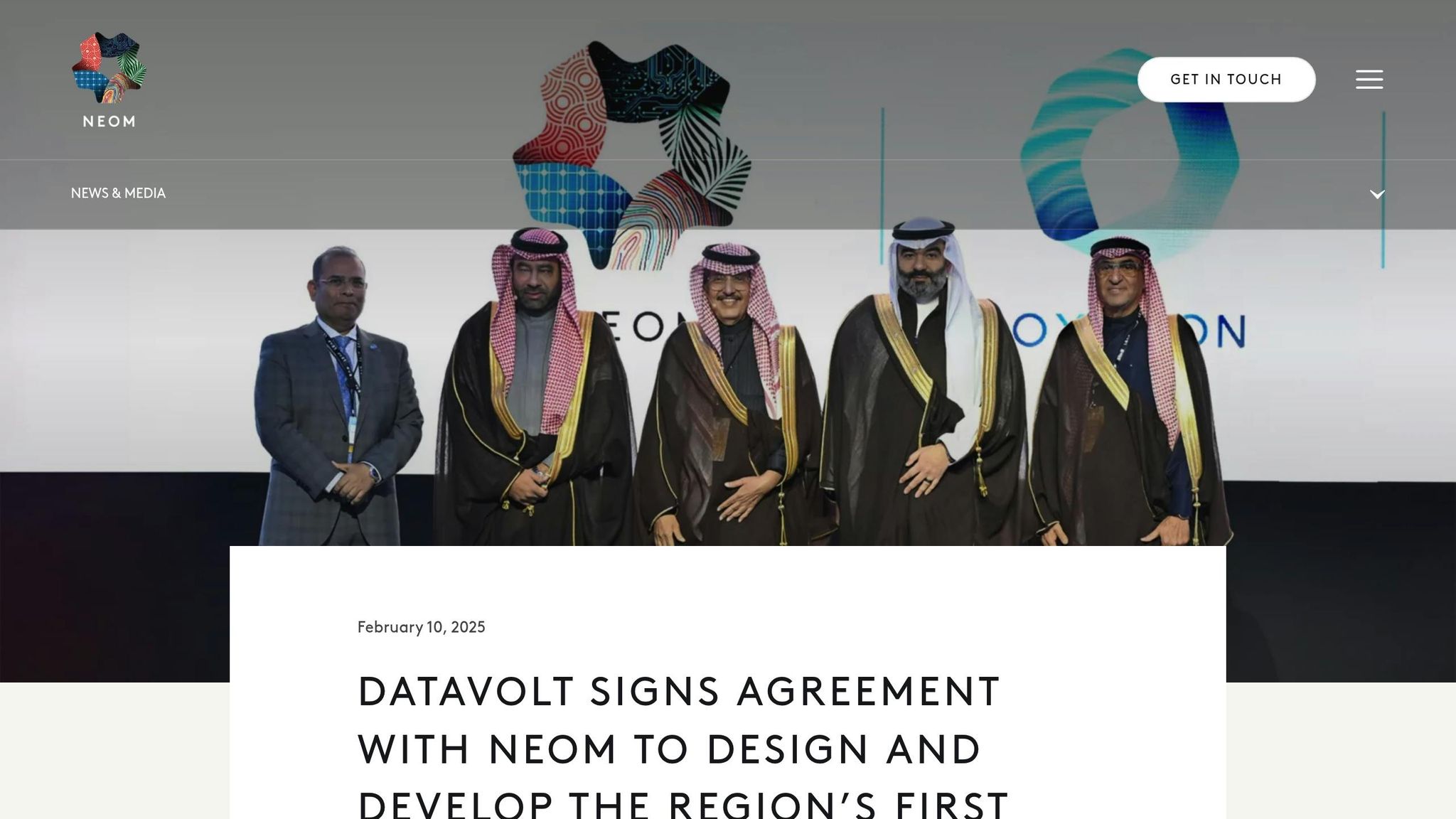
The DataVolt NEOM Center stands out as a cutting-edge data facility in the region, starting with an impressive 30MW IT load capacity and a roadmap to expand to 75MW by 2027. This state-of-the-art facility showcases advanced design and infrastructure, setting a new benchmark for data centers in the area.
Technical Specifications
| Feature | Details |
|---|---|
| IT Load | 30MW (Phase 1) |
| Tier Rating | Tier III+ |
| Redundancy | N+1 across critical systems |
| PUE Rating | Less than 1.3 |
| Cooling Type | Advanced liquid cooling |
| Network | Multi-carrier with access to Red Sea cable systems |
Strategically located in NEOM, the center benefits from exceptional connectivity via Red Sea submarine cable systems. It adheres to Saudi Arabia's data sovereignty requirements while offering robust disaster resilience.
Sustainability Credentials
The DataVolt NEOM Center integrates environmentally conscious practices to reduce its carbon footprint and operational costs:
- Operates entirely on 100% renewable energy from NEOM's grid.
- Sources 40% of its power from a dedicated solar farm.
- Achieves a 30% reduction in energy consumption through advanced liquid cooling technology.
- Recycles 95% of water used in its cooling systems.
- Maintains an impressive PUE rating below 1.3.
These sustainability measures not only align with global green initiatives but also enhance the facility's appeal to environmentally conscious clients.
Specialized Infrastructure
This facility incorporates AI-driven infrastructure to cater to modern computing demands:
- Dedicated GPU clusters for high-performance tasks.
- High-density computing capabilities.
- Hybrid sovereign cloud integration for secure operations.
- NEOM-focused edge computing solutions.
- Compliance with industry-specific regulations.
Market Impact
As the Gulf region continues its push towards digital sovereignty, the DataVolt NEOM Center plays a pivotal role in Saudi Arabia's growing data center ecosystem. It supports key sectors, including government ministries, financial services, and NEOM's ambitious smart city projects. This aligns with the broader GCC market growth, which is expected to reach USD 9.49 billion by 2030.
Certifications
The facility meets rigorous international and local standards, holding certifications such as:
- Uptime Institute Tier III
- ISO 27001 and ISO 9001
- PCI DSS 4.0
- SOC 2 Type II
- Saudi NCA framework compliance
- LEED Gold certification
Future Roadmap
Looking ahead, DataVolt plans to significantly expand its footprint. By 2027, the NEOM facility's capacity will triple. Additionally, a new 20MW data center is slated to open in Riyadh's King Abdullah Financial District by Q3 2026. Further expansions are planned in Jeddah and the Eastern Province, ensuring DataVolt remains a key player in the region's data center growth.
7. Beyon Tier III Center - Bahrain
The Beyon Tier III Center stands as a key player in Bahrain's journey toward digital transformation. This carrier-neutral facility highlights how regional providers can offer dependable data centre services while maintaining local control over essential digital assets.
Its advanced technical features, coupled with a prime location, make it a standout in the region.
Technical Infrastructure
| Feature | Specification |
|---|---|
| Certification | Uptime Institute Tier III |
| Power Redundancy | N+1 configuration |
| Security | Multi-layered physical & cyber protection |
| Connectivity | Carrier-neutral with multiple providers |
These specifications form the backbone of the centre’s operational reliability and efficiency.
Strategic Advantages
Situated in Manama's bustling business district, the facility is positioned to provide low-latency connectivity to the region's financial hubs. Its carrier-neutral design allows clients to select from multiple connectivity providers, ensuring greater network flexibility, improved resilience, and cost optimisation.
Sustainability Initiatives
Beyon has embraced energy-saving practices to align with Bahrain's Economic Vision 2030. The facility incorporates:
- Energy-efficient cooling systems to lower power usage.
- Green technologies aimed at reducing environmental impact.
These initiatives underscore its dedication to sustainable operations while supporting national goals.
Market Position
As the GCC's data centre market is set to draw investments of up to US$8 billion by 2027, the Beyon Tier III Center plays a vital role in serving regional financial institutions, government bodies, telecom operators, and enterprises adopting cloud technologies.
Future Roadmap
Looking ahead, Beyon is focused on expanding the facility’s capacity and improving its technological infrastructure. Plans include adding more data halls and increasing power capabilities to meet the rising demand for colocation and cloud services in the region.
8. Etisalat Data Center - Abu Dhabi
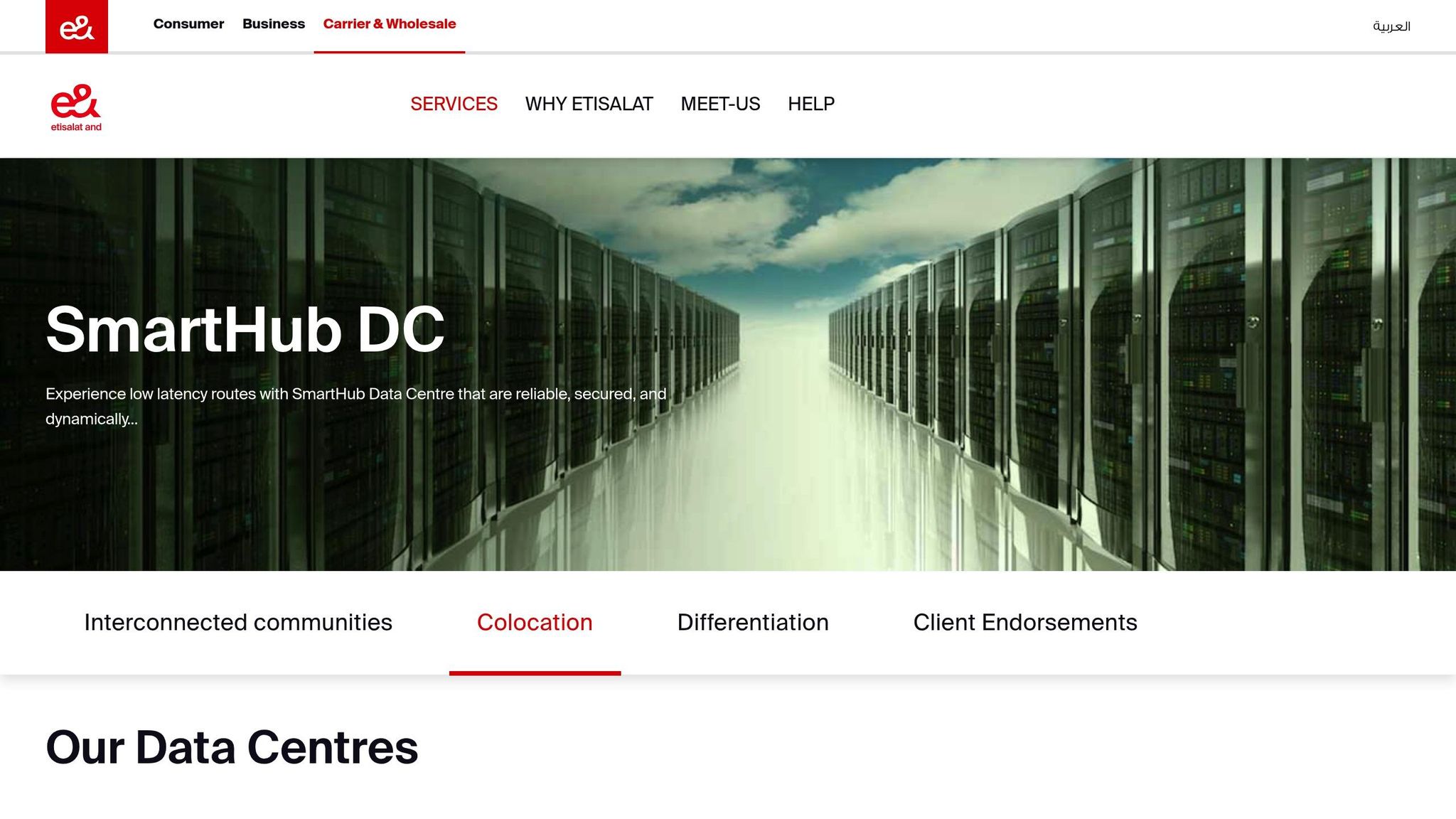
Etisalat's data center in Abu Dhabi is a cornerstone of the UAE's digital landscape, accounting for 40% of the nation's total data center power capacity.
Technical Infrastructure
This facility is designed to meet Tier III+ standards, ensuring high reliability through advanced redundancy systems:
| Feature | Specification |
|---|---|
| Power Redundancy | N+1 configuration |
| Uptime SLA | 99.99% |
| Security | Multi-layer biometric controls |
| Connectivity | Carrier-neutral connectivity |
| Cooling | Optimised cooling systems |
Strategic Advantages
Located in Abu Dhabi's business district, the data center is strategically positioned near key subsea cable landing points. This ensures seamless connectivity for both regional and international data traffic, making it a critical hub for digital operations.
Market Position
The facility plays a vital role in supporting the UAE's digital transformation goals. It caters to diverse sectors, including government initiatives, financial compliance, healthcare data needs, and enterprise cloud solutions.
Expansion Plans
To keep pace with growing demand, the data center is set to expand its power capacity by an additional 150 MW by the end of 2025. This aligns with the GCC's broader goals to strengthen digital sovereignty.
Sustainability Initiatives
Sustainability is a key focus for this facility. It incorporates smart power distribution systems and advanced cooling technologies, enhancing power usage efficiency. Real-time monitoring further optimises energy consumption.
Client Services
The center offers flexible colocation options, ranging from private suites to individual racks. It also provides managed hosting solutions, ensuring compliance with local data residency requirements while supporting critical workloads.
Future Outlook
With Abu Dhabi projected to attract over US$1.5 billion in digital infrastructure investments by 2027, Etisalat's data center is well-positioned to meet the rising demand for secure, high-performance solutions in the region.
9. Meeza M-VAULT - Qatar
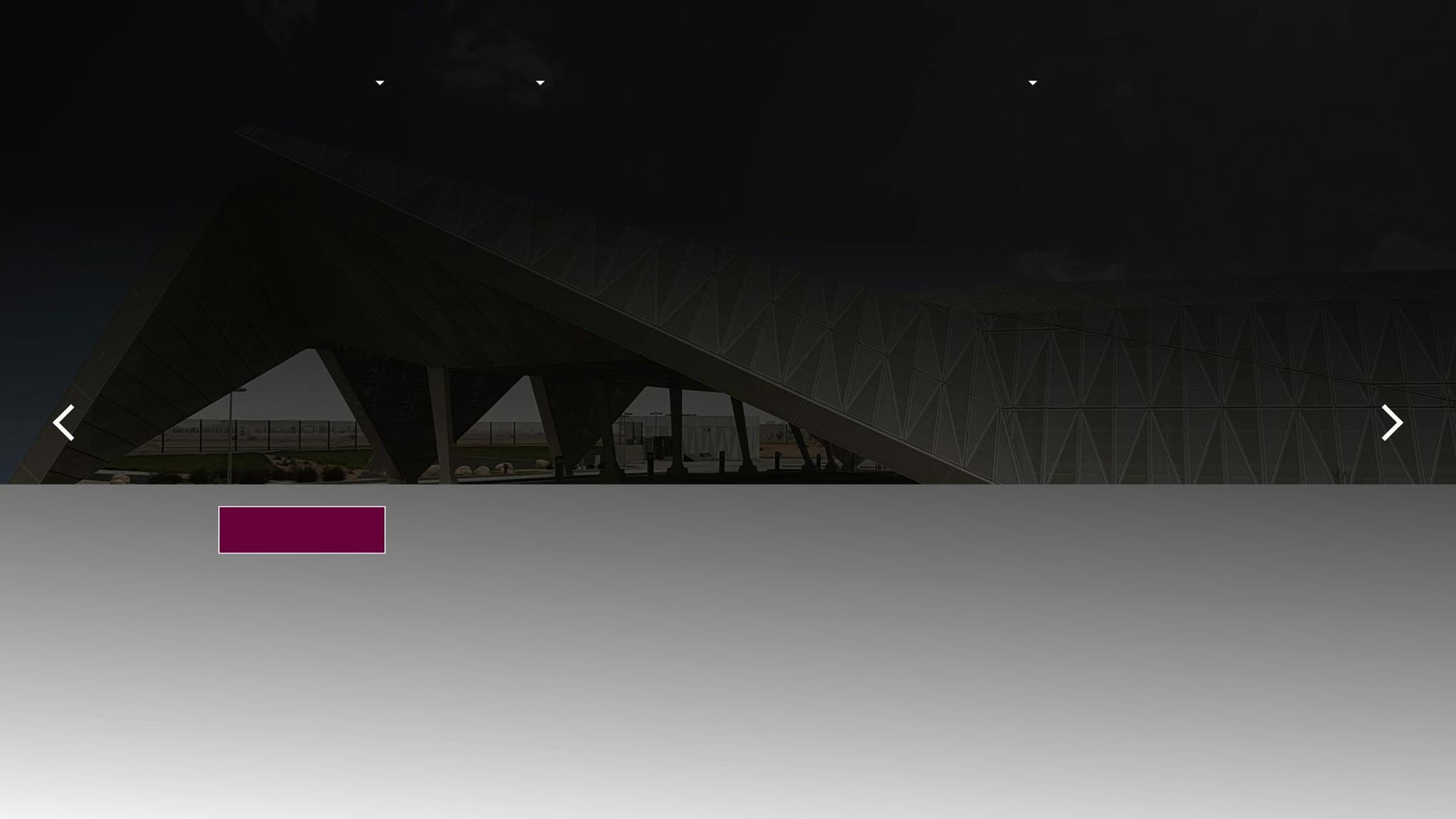
Meeza's M-VAULT stands as a carrier-neutral data centre in Qatar, offering 3,000 m² of white space and a power capacity of 15 MW. Strategically located in Qatar's growing tech hub, it serves as a vital interconnection point linking Europe, Asia, and Africa.
Technical Infrastructure
| Feature | Specification |
|---|---|
| Power Capacity | 15 MW with N+1 redundancy |
| Floor Space | 3,000 m² |
| Uptime Target | 99.999% |
| Network Latency | <4ms within Qatar, <30ms to GCC cities |
| Security Layers | 5-tier physical security |
| Cooling System | Hot/cold aisle containment |
These features ensure M-VAULT delivers dependable performance and operational excellence.
Strategic Advantages
M-VAULT’s robust infrastructure offers several advantages. Clients can choose from over 15 telecom providers, including Ooredoo and Vodafone Qatar. The facility also supports direct cloud connectivity with services like ExpressRoute and Direct Connect, enabling seamless integration with major cloud platforms. This makes it an ideal choice for hybrid cloud deployments.
Market Performance
During the pandemic, M-VAULT demonstrated resilience, maintaining 100% operational uptime while managing a 40% increase in bandwidth demand. This reliability has earned the trust of key sectors, including government, banking, and healthcare.
Expansion Roadmap
Meeza has outlined plans to boost its capacity by Q4 2025, adding 10 MW of power and introducing new features such as:
- Data halls designed for high-density computing
- Enhanced interconnection services
- A carrier-neutral internet exchange point
- Edge computing nodes distributed across Qatar
Sustainability Focus
M-VAULT prioritises energy efficiency with a Power Usage Effectiveness (PUE) below 1.5. Its sustainability efforts include:
- Variable frequency drive cooling systems
- Smart building management technologies
- Water-saving solutions
- Integration of renewable energy sources
Pricing Structure
Quarter racks are priced from AED 3,500 per month, while full cabinets (42U) range between AED 9,000 and AED 12,000. These competitive rates make M-VAULT an attractive option for businesses in the GCC region. Wholesale colocation rates are also available for large-scale deployments.
Future Outlook
As Qatar's data centre market contributes to the GCC’s projected growth to USD 9.49 billion by 2030, M-VAULT’s ongoing expansion and advanced capabilities position it as a cornerstone of the region's digital infrastructure.
GCC Data Center Market Changes
The Gulf region is set for a major shift in its digital infrastructure by 2025, driven by growing digital needs and the launch of new national cloud and edge computing initiatives. These changes are redefining the competitive environment as governments focus on achieving digital sovereignty through strategic investments.
National Cloud Sovereignty
GCC countries are rolling out national cloud projects to gain tighter control over sensitive data and adapt to evolving regulations. These initiatives aim to improve local service delivery, enhance data protection, and align with new data residency standards. Alongside these efforts, there’s a strong push towards edge computing, which brings data processing closer to users, offering faster and more secure services.
Edge Computing Expansion
In tandem with cloud strategies, the Gulf region is also emphasizing localized data processing. Edge computing has become a cornerstone of the region’s digital transformation, with the rapid development of edge data centers supporting the rise of smart city projects. These centers are designed to handle the increasing demands of new applications, ensuring the region stays ahead in the digital race.
Conclusion
The Gulf's data centre industry is experiencing rapid changes, with regional operators stepping up to redefine the ecosystem. The growing adoption of edge computing facilities is creating fresh opportunities for local providers to cater to the unique demands of the region.
This shift isn't just about meeting current needs; it's about preparing for what lies ahead. By the end of 2025, the spotlight will be on distributed edge infrastructure and AI-ready facilities, designed to deliver low-latency and efficient digital services. This ability to embrace emerging technologies sets regional operators apart from traditional hyperscale facilities, reflecting the Gulf's focus on both innovation and strong data governance.
These developments align with our evaluation criteria and underscore the strategic pivots taking place in the region. In our next analysis, we'll dive deeper into how edge computing and AI infrastructure are shaping the Gulf's digital future.
FAQs
What is driving the demand for sovereign cloud solutions and edge computing in the Gulf region?
The Gulf region is witnessing a surge in demand for sovereign cloud solutions and edge computing, driven by several important factors.
One major reason is the emphasis on data sovereignty. Governments and organisations are increasingly ensuring that sensitive data is stored and processed within their borders to comply with national regulations. This is particularly crucial in sectors like finance, healthcare, and government services, where data security and compliance are non-negotiable.
Another driving force is the rapid implementation of smart city initiatives and IoT technologies across the GCC. These advancements require faster data processing near the source, making edge computing indispensable. By cutting down on latency and boosting performance, edge solutions enable real-time applications like autonomous vehicles, smart grids, and sophisticated surveillance systems.
Additionally, the region's push for digital transformation and economic diversification has spurred investments in localised cloud infrastructure. These investments provide businesses with tailored solutions that offer enhanced flexibility, security, and scalability to meet the specific needs of the Gulf market.
How do Gulf data centers' sustainability efforts measure up against global hyperscale providers?
Gulf data centres are putting a strong emphasis on sustainability, aligning with global trends but following a different path compared to hyperscale providers like AWS and Google. While these global players often push for net-zero emissions through massive renewable energy projects, Gulf-based facilities are focusing on solutions tailored to the region. This includes harnessing solar energy, fine-tuning cooling systems to handle the region's intense heat, and meeting green building standards.
Interestingly, many Gulf providers are weaving sustainability into their growth plans, prioritising energy efficiency and cutting down carbon emissions. This approach not only makes them eco-friendly competitors but also helps meet the rising demand for data localisation and sovereignty within the region.
What challenges do independent Gulf data centres face compared to Big Tech-owned facilities?
Independent data centres in the Gulf face a tough playing field when competing with facilities owned by Big Tech giants. One major hurdle is economies of scale. Big Tech companies have massive budgets, enabling them to pour resources into advanced infrastructure, state-of-the-art technology, and global connectivity. For independent operators, staying competitive means being strategic with their spending.
Another obstacle is brand recognition and trust. Big Tech firms come with well-established reputations, making it easier for them to attract customers. Independent providers, on the other hand, need to prove their reliability, security, and ability to comply with local regulations. There's also a lingering perception that Big Tech offers better scalability and forward-thinking solutions, which can make it harder for smaller players to win over clients.
On top of that, localisation requirements present both challenges and opportunities. Adhering to data sovereignty laws and tailoring services to meet regional needs are essential, but they also demand significant effort and resources. For independent data centres, the key is to meet these demands while offering competitive pricing and aligning with sustainability goals to carve out a space in the Gulf's expanding market.
